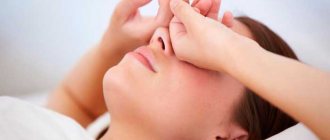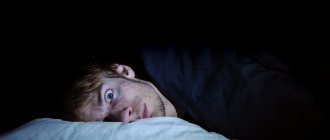Menopause is not a disease, but a normal physiological period in a woman’s life. It lasts several years, during which reproductive function gradually fades away. The female body gradually moves into a new phase of life - menopause. At this time, serious hormonal changes occur, which affect the functioning of all body systems.
During menopause, almost all women experience unpleasant sensations. These include insomnia. The woman finds it difficult to sleep, she often wakes up at night or wakes up very early - at 3-5 am. After getting up and throughout the day, she feels exhausted and not rested.
Two-thirds of women around the age of 50 experience sleep problems. The exact age at which sleep problems occur is impossible to name. For some women, menopause begins at the age of 37-40, for others - only after 50, or even 55 years.
Causes of insomnia
All causes of sleep disturbances during menopause can be divided into two groups: hormonal and psychological.
During menopause, the production of female sex hormones - estrogen and progesterone, as well as melanin, which is responsible for muscle relaxation, decreases. Changes in hormonal levels impair the body's absorption of magnesium, which also promotes muscle relaxation.
A woman may wake up to go to the restroom more often due to apnea (short-term cessation of breathing during sleep) or sudden snoring.
Hormonal reasons include changes in appearance and physiology. But their personal perception by a woman is already from the field of psychology.
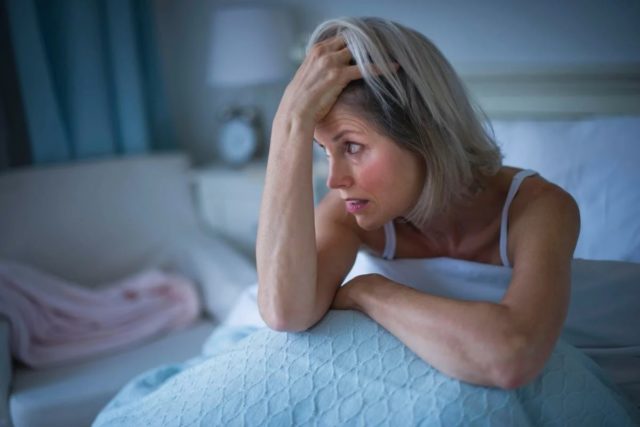
The psychological prerequisites for the development of insomnia are changes in the emotional background. Many women experience mood swings, increased emotional sensitivity, vulnerability; tearfulness, a critical attitude towards their changing appearance, a feeling of powerlessness in the face of new problems, poor health, and depression may occur. She can see the world in black colors. Various factors can enhance this feeling:
- severe stress;
- weight gain;
- drinking coffee too often;
- alcohol, drugs, smoking;
- overload at work, especially associated with disruption of the normal daily routine (overtime, night shifts);
- sedentary lifestyle;
- lack of time for yourself, restoration of your psychological resource.
Changes in behavior, attitude towards the world around us, and self-perception are facilitated by changes in physiology caused by hormones. But the psychological readiness of the woman herself for inevitable changes is also important.
Menopause is more easily tolerated by those who are ready to accept their new self, adjust their habits, thoughts and behavior, and learn to help themselves in order to maintain their own health. Usually in unusual situations the following attitude helps: “Even the computer is updated - life is even more so!” This may sound like a joke, but there is a lot of truth in it.
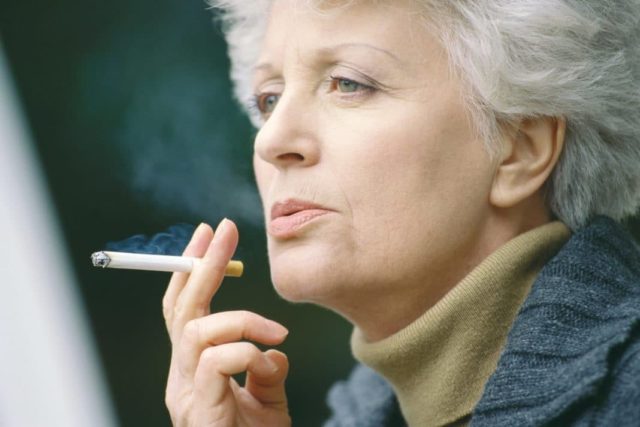
What is the danger of lack of sleep during menopause?
Age-related changes are considered a natural condition and do not pose a threat to women's health. Therefore, they should be taken calmly. However, menopause is accompanied by changes in hormonal levels, which are responsible for the appearance and rhythm of a person’s life.
Malfunctions of the endocrine system during menopause bring women a lot of inconvenience, accompanied by unpleasant sensations. The pathological process also reduces the protective properties of the body. Therefore, during menopause, old diseases may worsen.
When menopause occurs in conjunction with prolonged insomnia, the situation worsens. During menopause, sleep disturbance develops additional pathologies that cause significant harm to the female body.
Among the most dangerous diseases caused by insomnia during menopause are:
- obesity;
- stroke;
- depression;
- diabetes;
- myocardial infarction;
- cystitis;
- arterial hypertension.
To prevent this, several methods for eliminating insomnia have been developed.
The influence of hormonal levels
A decrease in estrogen and prostaglandin affects the condition of the skin, hair, and mucous membranes. The skin becomes drier, hair becomes weak and brittle. There may be unpleasant sensations in the genitals, and aching pain in the bones. Weakness of the pelvic floor muscles begins to be felt. This manifests itself as urinary incontinence during sneezing, coughing, lifting weights and other physical exertion. Hormonal changes provoke more frequent urges to go to the toilet, including during shallow sleep at night. Unusually low amounts of progesterone also directly affect sleep: this hormone is considered a natural sleep aid.
But the most famous phenomenon of menopause is hot flashes, which many people heard about even in their youth. What is it and how is it related to age-related female insomnia?
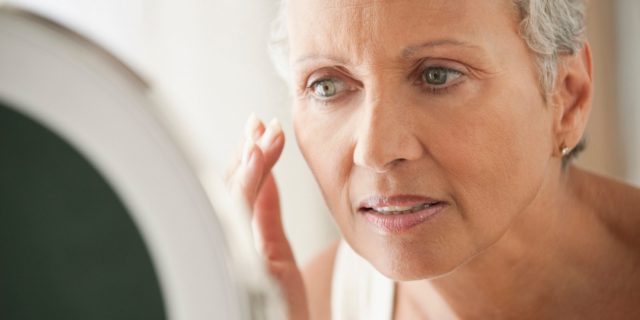
Hot flashes are a symptom of a restructuring of the body's thermoregulation. They manifest themselves as attacks of fever and excessive sweating. Tides occur both during the day and at night. Sometimes a woman sweats so much in her sleep that in the morning all her underwear and even her bed linen can only be sent to the wash. Moreover, sweat appears profusely not only under the armpits, but also on the back, chest, scalp, feet, and palms. There are cases when, going to bed in a rather cool room, due to hot flashes, a woman throws off the blanket in her sleep, and then wakes up from the cold, with her body wet from sweat.
Hormonal changes can provoke an increase in blood pressure up to the development of hypertension, other diseases of the cardiovascular system, memory impairment, brain activity, and joint diseases. However, these consequences are not the norm. To prevent them from occurring, it is important to pay attention to the first “bells” in time and take preventive measures.

Signs of sleep problems
When we talk about insomnia, we usually mean an almost complete lack of sleep at night or a prolonged inability to fall asleep. Such symptoms are most typical for a healthy person. But in women during menopause, insomnia acts in a more sophisticated way: specific symptoms of insomnia appear, which have a negative effect on a woman’s health.
A person who sleeps at least eight hours a day is able to restore the body after a working day. Women during menopause who experience insomnia do not have these eight hours to recover. In such a short time, they suffer from both direct signs of insomnia (inability to fall asleep) and indirect ones. Among the indirect signs of insomnia we note:
- the occurrence of snoring, which was not previously observed, due to which the woman often wakes up at night;
- manifestations of sleepwalking: talking in sleep, walking;
- apnea: holding your breath for more than ten seconds also leads to awakening and panic states;
- restless legs syndrome: leg pain, itching, restlessness that appears during sleep and leads to awakening;
- panic attacks, during which a woman abruptly jumps out of bed and wakes up with a feeling of anxiety gripping her;
- narcolepsy is a state of lack of sleep, a desire to sleep even during the day, and women actually fall asleep for a while even during the day.
Consequences for a woman’s body
It would be a mistake to consider insomnia during menopause a harmless phenomenon. When neglected, this disorder is dangerous. Due to constant lack of sleep, chronic fatigue accumulates. Insomnia depletes the nervous system and the entire body. Insomnia during menopause can lead to harmful consequences such as:
- depressive states;
- decreased performance, difficulty concentrating;
- loss of strength, weakness;
- heart attack;
- stroke;
- tachycardia;
- hypertonic disease;
- decreased immunity, susceptibility to colds;
- excess weight gain, obesity;
- diabetes;
- pancreatic diseases;
- gastritis;
- memory impairment (up to Alzheimer's disease);
- headaches, migraines;
- formation of tumors (including oncological ones);
- exacerbation of existing chronic diseases.
Due to the constant feeling of fatigue, weakness, lack of coordination and concentration, the likelihood of injuries at home and at work increases . This is especially dangerous given the fact that due to hormonal changes, calcium levels in the skeletal system decrease. Bones become more fragile. Osteoporosis often develops after age 50. But even without bone problems, poor health prevents a woman from existing normally, leading a normal lifestyle and feeling satisfaction from it.
Some of the troubles experienced during menopause are temporary and go away without treatment. But there are symptoms that require you to seek medical help.
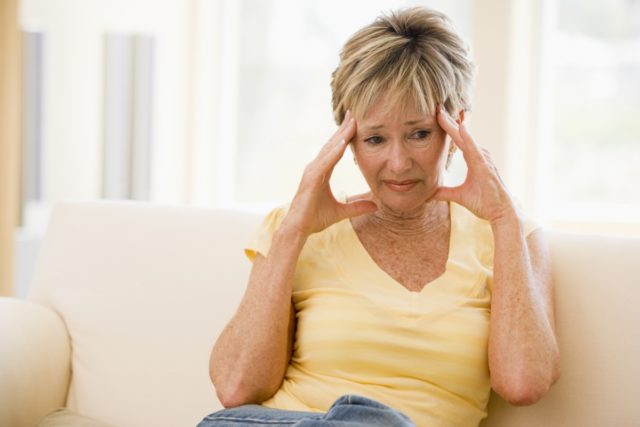
Consequences of sleep disturbances during menopause
Chronic lack of sleep can provoke the emergence of a number of somatic and psychological diseases in a woman, which is why it is so important to start the fight as early as possible. Everyone probably knows the state of weakness and exhaustion after a sleepless night. It is worth noting that these are not the most dangerous conditions. Sleep disorders can cause much more serious pathologies:
- Cerebral circulation disorders, heart attacks.
- Migraines with aura (hard to get rid of).
- Impaired sensitivity in the limbs, chronic pain in joints and muscles.
- Hypertonic disease.
- Mental disorders (neuroses, depression).
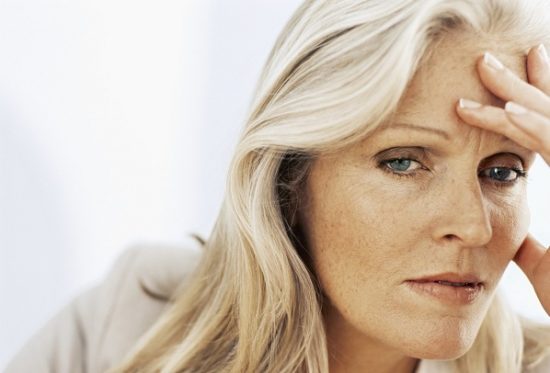
Menopause should not become a reason to give up physical activity; on the contrary, moderate exercise, aerobics and morning exercises help improve mood and get rid of insomnia.
Lack of proper sleep at night leads to a decrease in immunity, the ability to resist infections is impaired, and the nervous, vascular, and endocrine systems are depleted. Memory, thinking, attention, concentration, and reaction to external influences noticeably deteriorate. Insomnia has a negative impact on family relationships when a woman is simply physically unable to provide adequate attention to her husband and children. Irritability and suspiciousness lead to conflicts at work and in the team.
When to worry
A slight discomfort during menopause can be considered normal. The same can be said about short-term sleep disorders. However, if insomnia persists for more than a week, you need to go to the doctor. Don’t be shy and consider your problem trivial!
Also, numerous hot flashes, depressive moods, pain and other phenomena that interfere with normal sleep should be a reason to consult a doctor.

Effective ways to get rid of insomnia
You can normalize sleep in case of a mild disorder by following simple rules: do not eat heavily before bed, do not drink a lot of water at night - it is better to replace it with a glass of milk with honey; ventilate the bedroom, keep it clean, etc. Traditional methods often help in the fight against insomnia; only in more complex cases are the patients prescribed medications.
Treatment of insomnia during menopause has two goals: to stop the manifestations of diseases and eliminate hormonal imbalance. A systematic approach is important, since hormonal drugs are prescribed to compensate for hormone deficiency, which, however, are strictly contraindicated in a number of concomitant pathologies.
Hormonal therapy is not prescribed if a woman has:
- oncological diseases;
- diseases of an autoimmune nature;
- severe kidney damage;
- diabetes mellitus at any stage.
If these ailments are not present, the doctor may recommend taking Klimadinon, Qi-Clean, Feminal, Revens or other similar drugs. They normalize the level of female hormones, but have a number of side effects: headaches, weight gain, headaches, and perhaps just mild ailments. Each medication is selected individually.

Additional remedies to combat insomnia
Addressing sleep problems is, of course, a multi-faceted therapy. In order to get rid of insomnia, medications or herbal decoctions alone are not enough. Additional remedies to combat sleep deprivation are easy to use and have the usual recommendations. Here are some of them:
- Physical exercise and an active lifestyle are the main rules for the overall health of the body. Light gymnastics, brisk walking, and cycling are suitable. Such simple methods will help you get rid of excess weight and strengthen your cardiovascular system. The main thing is to properly allocate time for classes. In the evening, it is better to avoid heavy stress on the body.
- It is also important to take care of your sleeping conditions. Fresh air in the room is the key to a good sleep. When choosing pajamas, it is better to give preference to natural fabrics.
- Daily routine is also of great importance. Decrease in hormone levels often provoke changes in the usual routine of life. Therefore, it is important to accustom the body to a daily routine.
- Use additional methods to relax the body. Before going to bed, you need to relax. To do this, you can use massage, a warm bath and pleasant music.
Sleeping pills
Sleeping pills are prescribed in exceptional cases when other medications do not provide the desired effect.
In some cases, it is quite enough to take sedatives based on herbal components: tincture or tablets of valerian, motherwort, Fitosed, Sedavit. If they do not help, the patient is prescribed sleeping pills (Atarax, Rozerem, Imovan) or tranquilizers (for example, Afobazol). If the sleep disorder is severe and combined with depression, then it comes to the use of antidepressants. Only a doctor should select medications. Self-medication can lead to unpredictable consequences.

Possible complications
It is necessary to combat sleep disturbances, since the symptoms of menopause can aggravate the situation, provoking various complications in the body. With negative factors affecting the functioning of all internal organs and systems, exacerbation of chronic diseases and the emergence of new ones are quite possible.
Menopause and insomnia over a long period of time can lead to the following consequences:
- development of myocardial infarction;
- arterial hypertension 2, 3 degrees;
- stroke;
- decreased functioning of the immune system;
- diabetes mellitus;
- gaining extra pounds;
- the occurrence of muscle and joint pain;
- the development of anemia, the presence of a metallic taste in the mouth.
Important! The above symptoms cause a woman even more suffering than the calm course of menopause. Therefore, insomnia must be treated in the early stages, before prolonged depression and other psychological disorders occur.
Traditional methods
For good sleep, it is recommended to drink infusions of herbs: mint, chamomile, lemon balm, thyme, oregano. You can prepare them personally, or purchase ready-made mixtures or special herbal tea at the pharmacy. For relaxation, you need to drink a cup of this tea before going to bed. A glass of warm milk, as well as milk or tea with honey, helps.
It is effective to take a quarter glass of hop infusion before bed. To prepare it, pour boiling water over 2 tablespoons of dried hop cones and leave for 4 hours.
In much the same way, traditional medicine advises preparing an infusion of sorrel (taken in the same dose at the same time).
Possible treatment options
During menopause, a balanced diet is extremely important. It is necessary to include sources of calcium - dairy products (especially without high fat content), fish and seafood containing iodine, vitamin D, Omega-3 polyunsaturated fatty acids. Fresh vegetables and fruits, rich in vitamins and minerals, must be present in the daily menu during menopause. Lean meats, whole grain bread, legumes, cereals, and herbal teas are healthy. Black tea and coffee should be limited, alcohol and nicotine should be completely eliminated.
If measures are not taken, the woman’s body will be defenseless against the upcoming changes. Therefore, you need to try to protect yourself from unnecessary stress, anxiety, overload, and discomfort. Pleasant treatments such as an evening walk, massage, aromatherapy, or a relaxing bath have a wonderful effect on the body and improve night's sleep.
Is there a cure for this?
Treatment of insomnia during menopause is selected individually in each case. The doctor takes into account not only the manifestations of insomnia, but also other signs, concomitant diseases, and lifestyle.
Before deciding what to do for insomnia that appears during menopause, additional examination may be required. Often the cause of disorders is brain tumors, endocrine and vascular diseases.
Treatment begins with lifestyle changes. Doctors recommend avoiding night shifts and evening work. Before going to bed, you need to be at home so that you can create rituals that set you up for sleep. This could be an evening walk in the fresh air, reading a short passage of a book, warm milk. You should avoid tea and coffee; these drinks contain caffeine, which stimulates the nervous system and prevents you from falling asleep.
There is no need to watch TV before bed, especially programs that cause a surge of emotions. An additional adrenaline rush will not help you relax. It is useful to ventilate the bedroom before going to bed and maintain its temperature at 18-19°C. This will help you tolerate hot flashes more easily and reduce sweating.
If during the day there is a desire to sleep, then you can allow yourself a short rest. But you don’t need to doze off after 17:00, it won’t help you build the right daily routine.
Heavy physical work is harmful; overwork can lead to both rapid falling asleep and the appearance of insomnia.
Moderate physical activity is beneficial during menopause. They tone you up and add energy. In the morning, exercise will help cope with drowsiness. Some women do exercises during the day to combat the urge to sleep.
It is not advisable to exercise in the evening. But simple exercises are allowed a few hours before bedtime. Properly selected physical activity, swimming and yoga give a feeling of pleasant fatigue and can speed up falling asleep.
To maintain tone and lose weight, you can use not only sports. Hiking, Nordic walking and even dancing are suitable.
ethnoscience
Traditional healers offer their own ways to overcome the manifestations of insomnia during menopause. These are infusions and decoctions of herbs in various combinations:
- chamomile;
- fennel;
- ginger root;
- hawthorn;
- valerian root;
- Melissa;
- motherwort;
- hop cones.
Milk with honey and cinnamon and oat tea help. There are recipes for soothing baths with the addition of herbal infusions, sea salt and essential oils. You can use an aroma lamp to fill your bedroom with a pleasant aroma. But in some cases, aromatherapy during menopause can lead to the opposite effect: the smell will seem irritating, cause a headache and prevent you from falling asleep. Therefore, the choice of a traditional method must be approached with caution.
Dietary supplements and vitamins
Vitamin supplements play a supporting role. They do not directly affect sleep, but can improve metabolic processes in the body. The following vitamins are important for women's health during menopause:
- A (retinol) – accelerates intracellular processes, participates in the synthesis of steroid hormones;
- C (ascorbic acid) – affects lipid metabolism, strengthens the vascular wall;
- E (tocopherol) – improves capillary blood flow in the hypothalamic region, participates in the synthesis of sex hormones;
- D (calciferol) is a participant in calcium metabolism, the basis of women’s health, regardless of age.
It is convenient to take vitamins in the form of ready-made complexes. For women during menopause, ready-made formulations have been developed that take into account age-related needs:
- Vitatress;
- Alphabet 50;
- Extravel;
- Femicaps.
The main reason for sleep problems is hormonal surges. Therefore, the main treatment comes down to correcting hormonal imbalances. Medicines for insomnia during menopause should be selected by a doctor. They are prescribed individually, taking into account contraindications and health problems.
For mild menopause, which occurs in only 16% of women, it is sufficient to prescribe herbal homeopathic preparations containing phytoestrogens (Klimadinon, Qi-Klim, Remens). They help compensate for the lack of their own hormones and have fewer side effects and contraindications.
The main way to compensate for the lack of estrogen during menopause and eliminate the manifestations of this condition is hormone replacement therapy. It suppresses the appearance of hot flashes, sweating, and along with them, insomnia goes away. But hormones are not prescribed if there are only problems with sleep and there are no other signs of approaching menopause.
The type of hormonal drug is selected individually. It could be:
- estrogen monotherapy;
- combination of estrogen-progestin drugs;
- use of gestagens only;
- combination of estrogens and androgens.
After consultation with a psychotherapist, medications that affect brain processes and regulate sleep (Grandaxin, Atarax, Melaxen) may be prescribed. They belong to different pharmacological groups and are taken in short courses so as not to cause addiction.


